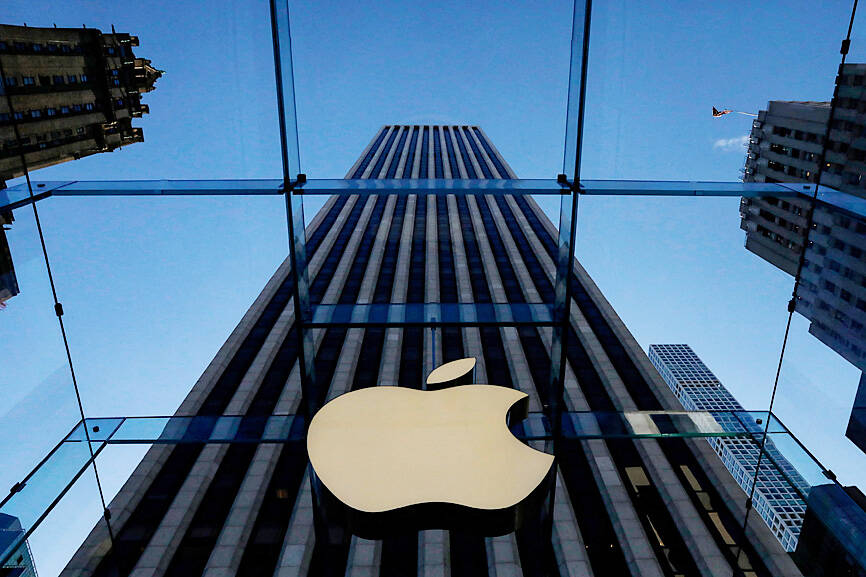Apple Inc on Wednesday said that it is beefing up defense of data that users store in the cloud, a move that could thwart authorities as well as hackers.
The iPhone maker’s Advanced Data Protection plan extends something called end-to-end encryption beyond its iMessage service to photographs and other data backed up to its iCloud storage service.
Apple said the move was urgent given an alarming increase in data breaches that had seen 1.1 billion personal records exposed across the globe last year, according to company research.

Photo: Reuters
“Advanced Data Protection is Apple’s highest level of cloud data security,” said Ivan Krstic, Apple’s head of security engineering and architecture.
It gives “users the choice to protect the vast majority of their most sensitive iCloud data with end-to-end encryption so that it can only be decrypted on their trusted devices,” he added.
Apple told the Wall Street Journal that with the heightened security, it would no longer be able to hand over iMessage history and other files, even when legally requested to do so by investigators.
The move would potentially rekindle a long period of standoffs involving technology firms and law enforcement.
Apple notably resisted a legal effort to weaken iPhone encryption to allow authorities to read messages from a suspect in a 2015 bombing in San Bernardino, California.
Police officials worldwide say encryption can protect criminals, terrorists and pornographers even when authorities have a legal warrant for an investigation.
However, civil rights and privacy advocates, along with cybersecurity professionals, advocate encrypting data to protect against wrongful snooping by authorities as well as hackers.
“We constantly identify and mitigate emerging threats to [user] personal data on device and in the cloud,” Apple senior vice president of software engineering Craig Federighi said in a post.
Under the new setting, Apple said only iCloud Mail, Contacts and Calendar would remain unencrypted because of the need to operate with other systems.
The new level of security would be available in the US by the end of this month and be rolled out globally next year, the company said.
Apple has championed data privacy as a way to differentiate itself from tech giants Meta Platforms Inc and Google, which closely track online activity by users to boost advertising revenue.
Separately, Google yesterday said that it would merge teams working on mapping service Waze and products like Google Maps, effective today, in a bid to consolidate processes.
The Alphabet Inc-owned company would integrate Waze, which it acquired in 2013 for US$1 billion, into Google Geo, its portfolio of real-world mapping products that include Google Maps, Google Earth and Street View, a Google spokesperson said.
Waze CEO Neha Parikh would exit the company following a transition period, Google said, adding that Waze would continue to be a standalone app, with about 151 million monthly active users worldwide.
“By bringing the Waze team into Geo’s portfolio of real-world mapping products, the teams will benefit from further increased technical collaboration,” the spokesperson said.
Additional reporting by Reuters

STEEP DECLINE: Yesterday’s drop was the third-steepest in its history, the steepest being Monday’s drop in the wake of the tariff announcement on Wednesday last week Taiwanese stocks continued their heavy sell-off yesterday, as concerns over US tariffs and unwinding of leveraged bets weighed on the market. The benchmark TAIEX plunged 1,068.19 points, or 5.79 percent, to 17,391.76, notching the biggest drop among Asian peers as it hit a 15-month low. The decline came even after the government on late Tuesday authorized the NT$500 billion (US$15.2 billion) National Stabilization Fund (國安基金) to step in to buoy the market amid investors’ worries over tariffs imposed by US President Donald Trump. Yesterday’s decline was the third-steepest in its history, trailing only the declines of 2,065.87 points on Monday and

TAKING STOCK: A Taiwanese cookware firm in Vietnam urged customers to assess inventory or place orders early so shipments can reach the US while tariffs are paused Taiwanese businesses in Vietnam are exploring alternatives after the White House imposed a 46 percent import duty on Vietnamese goods, following US President Donald Trump’s announcement of “reciprocal” tariffs on the US’ trading partners. Lo Shih-liang (羅世良), chairman of Brico Industry Co (裕茂工業), a Taiwanese company that manufactures cast iron cookware and stove components in Vietnam, said that more than 40 percent of his business was tied to the US market, describing the constant US policy shifts as an emotional roller coaster. “I work during the day and stay up all night watching the news. I’ve been following US news until 3am

Six years ago, LVMH’s billionaire CEO Bernard Arnault and US President Donald Trump cut the blue ribbon on a factory in rural Texas that would make designer handbags for Louis Vuitton, one of the world’s best-known luxury brands. However, since the high-profile opening, the factory has faced a host of problems limiting production, 11 former Louis Vuitton employees said. The site has consistently ranked among the worst-performing for Louis Vuitton globally, “significantly” underperforming other facilities, said three former Louis Vuitton workers and a senior industry source, who cited internal rankings shared with staff. The plant’s problems — which have not

TARIFF CONCERNS: The chipmaker cited global uncertainty from US tariffs and a weakening economic outlook, but said its Singapore expansion remains on track Vanguard International Semiconductor Corp (世界先進), a foundry service provider specializing in producing power management and display driver chips, yesterday withdrew its full-year revenue projection of moderate growth for this year, as escalating US tariff tensions raised uncertainty and concern about a potential economic recession. The Hsinchu-based chipmaker in February said revenues this year would grow mildly from last year based on improving supply chain inventory levels and market demand. At the time, it also anticipated gradual quarter revenue growth. However, the US’ sweeping tariff policy has upended the industry’s supply chains and weakened economic prospects for the world economy, it said. “Now